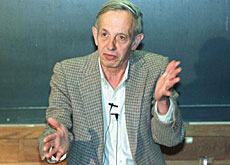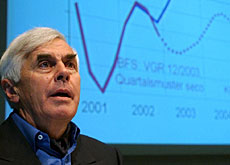Nobel laureate says Swiss economy “gets it right”

The economic debate in Switzerland tends to be dominated by negative headlines about stagnant growth, spiralling health costs and lack of competition.
But in an interview with swissinfo, Nobel prize-winning economist John Nash says Switzerland is the country whose economic policy “comes closest to getting it right”.
Professor Nash, best known as the pioneer of game theory, made the comment in response to a recent survey carried out by the “Wall Street Journal”.
Other Nobel laureates plumped for countries ranging from Norway to the United States and China.
Nash’s tone is markedly different to that of domestic analysts, who continually see dark clouds looming for the economy.
Switzerland’s KOF Institute for Business Cycle Research added to the prevailing negative tone on Tuesday, saying it expected current economic growth to peak by the end of 2004.
swissinfo spoke to Nash about Swiss economic policy, the role of common sense in business decisions, the limits of economics and the definition of quality of life.
swissinfo: What do you think the Swiss do right?
John Nash: Quite simply, I think they don’t do “wrong” things that others do, which are supposed to enhance the strength of an economy, but fail to be beneficial in the longer term.
I think Switzerland has benefited enormously from having a currency of comparatively superior quality. This in turn has favoured the local climate for enterprises such as those in the insurance or investment banking sectors. It is no coincidence that the financial services sector is so important in the Swiss economy – it is not just cheese and chocolate that you export.
swissinfo: What are the “wrong” things that the Swiss avoid?
J.N.: Some people might suggest that economic policy should aim to decrease the value of the Swiss franc, to help stimulate exports. Of course, there is some truth in this, but it ignores a very important factor, which is the reputation of a currency.
For instance, the dollar is becoming gradually less respectable than it used to be, but it is still at about the same competitive level as the euro, the pound sterling or the yen. Below the dollar are currencies like those of Argentina and Brazil, where devaluation doesn’t seem to have helped very much.
Arguably, the Swiss franc is at the best level of all, and that is very important. In Switzerland, people are probably not thinking all the time that they would do better by putting their money in dollars in a foreign account.
swissinfo: What do you think is at the root of the Swiss franc’s reputation?
J.N.: Someone once got a Nobel Prize for developing the concept of rational expectations. This says that, while governments say they are doing this or that, this may be just propaganda. The private sector, however, may look at the situation in a more rational way – they may know what to really expect. So you could say the reputation is based more on what they think.
swissinfo: What other countries do you think come closest to getting it right in terms of economic policy?
J.N.: Actually, I think Japan is not doing so badly. They are criticised for doing the wrong things, but who has the higher standard of living in Asia? If you have a higher standard of living, that is surely a sign of a good economy.
swissinfo: If you had to give one piece of economic policy advice to a government anywhere in the world, what would it be?
J.N.: That is what I don’t have. It is like advising a doctor how to treat his patients, when the real problem is too much doctoring. There are many countries that have injured themselves by having a disreputable currency. In Argentina, for instance, things could certainly have been done otherwise. But then, to do them better would not make it a super-economy. You have to realise that, even if you do the best thing, you may still be only modestly prosperous.
swissinfo: Switzerland has not joined the EU. What do you think has been the economic impact of that decision?
J.N.: Well, it is obviously difficult to stay out, but Switzerland seems to have done relatively well with its independence, so it is hard to know. There is also the euro to be joined at some time, but I would presume that the Swiss would at least wait for the British and the Danes and the Swedes to join before rushing in.
swissinfo: One consequence of joining the euro would surely be the loss of direct control over interest rate levels?
J.N.: It is natural for interest rates to be low if the currency is respected. If there is a low expectation of inflation, then interest rates should be low, and vice versa. This is where rational expectations come in. However, the euro phenomenon means that the less respectable currencies have been merged with the more respectable, which is a radical shift.
swissinfo: Do you think it is possible for such a disparate area as the EU to have a successful common monetary policy?
J.N.: They can certainly have a common currency, which has clear advantages; a common policy is another matter. If the euro system was similar to, say, the old gold standard, you could have a common currency that exists independently, without the need for a common management policy. The important thing is that the money itself has a certain value.
swissinfo: Looking ahead, what do you see as the major problem facing the world economy in future?
J.N.: One big issue is how to maintain our standard of living – let alone how to define it. Technology and science give us many appreciable benefits, and life expectancy is rising. However, the human population is expanding continuously, so we have less and less of the Earth per person – yet we still try to think that we have ever higher living standards.
swissinfo-interview: Chris Lewis
Professor Nash, a professor of mathematics at Princeton University, New Jersey, won the 1994 Nobel Prize for economics.
He is best known for pioneering game theory – the mathematical modelling of how groups of people interact, for instance in contract negotiations.
Nash was also the subject of the book and film, “A Beautiful Mind”.
Professor Nash says Switzerland is number one worldwide when it comes to economic policy.
He says Switzerland has benefited “enormously” from a consistently strong currency – and policy-makers who don’t try to change that.
Nash says good economic policy is based on the realisation that policymakers cannot dictate actual market behaviour.

In compliance with the JTI standards
More: SWI swissinfo.ch certified by the Journalism Trust Initiative

You can find an overview of ongoing debates with our journalists here. Please join us!
If you want to start a conversation about a topic raised in this article or want to report factual errors, email us at english@swissinfo.ch.